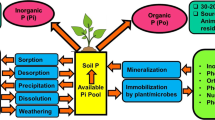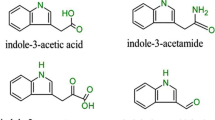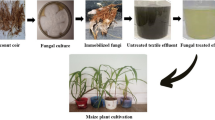Abstract
The use of plant growth promoting microbes (PGP) microbes in agriculture has increased due to negative impact of the chemical fertilizers. PGP microbes enhance the plant growth and productivity by diverse mechanisms such as the biological nitrogen fixation; solubilization of phosphorus, potassium and zinc; production of siderophores, plant growth regulators, hydrolytic enzymes, and various phytohormones. PGP microbes as bio-inoculants have been used as sources to improve plant nutrients in sustainable agriculture. The present study was designed to investigate the impact of single as well as the co-inoculation of a nitrogen fixer (Acinetobacter guillouiae EU-B2RT.R1) and a potassium solubilizer (Acinetobacter calcoaceticus EU- LRNA-72) in combination with chemical fertilizers for growth promotion of onion. Each strain used as bio-inoculants positively impacted shoot length, root length, biomass, phenolic, flavanoids, total soluble sugars and chlorophyll content of onion. Thus, nitrogen fixing and potassium solubilizing bacteria could be a promising and potential alternative for utilizing as source of fertilizers to horticultural system and to maintain greater nutrients availability in soil for agricultural sustainability.

Similar content being viewed by others
Abbreviations
- PGP Microbes:
-
Plant growth promoting microbes
- PGPR:
-
Plant growth promoting rhizobacteria
- VAM:
-
Vesicular Arbuscular Mycorrhiza
References
Cakmak I (2005) The role of potassium in alleviating detrimental effects of abiotic stresses in plants. J Plant Nutr Soil Sci 168:521–530. https://doi.org/10.1002/jpln.200420485
Devi R, Kaur T, Kour D, Yadav AN, Suman A (2022) Potential applications of mineral solubilizing rhizospheric and nitrogen fixing endophytic bacteria as microbial consortium for the growth promotion of chilli (Capsicum annum L). Biologia 77:2933–2943. https://doi.org/10.1007/s11756-022-01127-2
Dixon R, Kahn D (2004) Genetic regulation of biological nitrogen fixation. Nat Rev Microbiol 2:621–631. https://doi.org/10.1038/nrmicro954
Dursun A, Ekinci M, Dönmez MF (2010) Effects of foliar application of plant growth promoting bacterium on chemical contents, yield and growth of tomato (Lycopersicon esculentum L.) and cucumber (Cucumis sativus L). Pak J Bot 42:3349–3356
Emami S, Alikhani HA, Pourbabaei AA, Etesami H, Sarmadian F, Motessharezadeh B (2019) Effect of rhizospheric and endophytic bacteria with multiple plant growth promoting traits on wheat growth. Environ Sci Pollut Res 26:19804–19813. https://doi.org/10.1007/s11356-019-05284-x
Emmanuel OC, Babalola OO (2020) Productivity and quality of horticultural crops through co-inoculation of arbuscular mycorrhizal fungi and plant growth promoting bacteria. Microbiol Res 239:126569. https://doi.org/10.1016/j.micres.2020.126569
Esitken A (2011) Use of Plant Growth promoting Rhizobacteria in Horticultural crops. In: Maheshwari DK (ed) Bacteria in Agrobiology: Crop Ecosystems. Springer Berlin Heidelberg, Berlin, Heidelberg, pp 189–235. https://doi.org/10.1007/978-3-642-18357-7_8
Gong W, Xing Y, Zhuoma QC, Yue H, Chen J (2018) Isolation, identification and low temperature adaptation of a phosphorus solubilizing bacteria from rhizosphere soil of Rhodiola fastigiata in Sehgyla Mountains. J South Agric 49:280–286
Gopalakrishnan S, Vadlamudi S, Samineni S, Sameer Kumar CV (2016) Plant growth-promotion and biofortification of chickpea and pigeonpea through inoculation of biocontrol potential bacteria, isolated from organic soils. SpringerPlus 5:1882. https://doi.org/10.1186/s40064-016-3590-6
Han H, Lee K (2005) Phosphate and potassium solubilizing bacteria effect on mineral uptake, soil availability and growth of eggplant. Res J Agric Biol Sci 1:176–180
Han HS, Lee K (2006) Effect of co-inoculation with phosphate and potassium solubilizing bacteria on mineral uptake and growth of pepper and cucumber. Plant Soil Environ 52:130
Irigoyen J, Einerich D, Sánchez-Díaz M (1992) Water stress induced changes in concentrations of proline and total soluble sugars in nodulated alfalfa (Medicago sativd) plants. Physiol Plant 84:55–60. https://doi.org/10.1111/j.1399-3054.1992.tb08764.x
Jha A, Pal N, Saxena A, Singh D, Jha G (2005) Coinoculation effect of VAM and PGPR on growth and yield of onion. Indian J Hortic 63:44–47
Kartik VP, Jinal HN, Amaresan N (2021) Inoculation of cucumber (Cucumis sativus L.) seedlings with salt-tolerant plant growth promoting bacteria improves nutrient uptake, plant attributes and physiological profiles. J Plant Growth Regul 40:1728–1740. https://doi.org/10.1007/s00344-020-10226-w
Kaur T, Devi R, Kumar S, Sheikh I, Kour D, Yadav AN (2022) Microbial consortium with nitrogen fixing and mineral solubilizing attributes for growth of barley (Hordeum vulgare L). Heliyon 8:e09326. https://doi.org/10.1016/j.heliyon.2022.e09326
Kaur T, Devi R, Kumar S, Kour D, Yadav AN (2023) Plant growth promotion of pearl millet (Pennisetum glaucum L.) by novel bacterial consortium with multifunctional attributes. Biologia 78:621–631. https://doi.org/10.1007/s11756-022-01291-5
Kour D, Rana KL, Kaur T, Yadav N, Halder SK, Yadav AN, Sachan SG, Saxena AK (2020a) Potassium solubilizing and mobilizing microbes: biodiversity, mechanisms of solubilization and biotechnological implication for alleviations of abiotic stress. In: Rastegari AA, Yadav AN, Yadav N (eds) Trends of Microbial Biotechnology for Sustainable Agriculture and Biomedicine Systems: Diversity and Functional Perspective. Elsevier, Amsterdam pp 177–202. https://doi.org/10.1016/B978-0-12-820526-6.00012-9
Kour D, Rana KL, Yadav AN, Sheikh I, Kumar V, Dhaliwal HS, Saxena AK (2020b) Amelioration of drought stress in Foxtail millet (Setaria italica L.) by P-solubilizing drought-tolerant microbes with multifarious plant growth promoting attributes. Environ Sustain 3:23–34. https://doi.org/10.1007/s42398-020-00094-1
Kuan KB, Othman R, Abdul Rahim K, Shamsuddin ZH (2016) Plant growth-promoting rhizobacteria inoculation to enhance vegetative growth, nitrogen fixation and nitrogen remobilisation of maize under greenhouse conditions. PLoS ONE 11:e0152478. https://doi.org/10.1371/journal.pone.0152478
Kumari B, Mallick MA, Solanki MK, Solanki AC, Hora A, Guo W (2019) Plant Growth promoting Rhizobacteria (PGPR): modern prospects for sustainable agriculture. In: Ansari RA, Mahmood I (eds) Plant Health under biotic stress: volume 2: microbial interactions. Springer Singapore, Singapore, pp 109–127. https://doi.org/10.1007/978-981-13-6040-4_6
Lanzotti V (2006) The analysis of onion and garlic. J Chromatogr 1112:3–22. https://doi.org/10.1016/j.chroma.2005.12.016
Leghari SJ, Wahocho NA, Laghari GM, Laghari AH, Bhabhan GM, Talpur KH, Bhutto TA, Wahocho SA, Lashari AA (2016) Role of nitrogen for plant growth and development: a review. Adv Environ Biol 10:209–218
Lichtenthaler HK (1987) Chlorophylls and carotenoids: pigments of photosynthetic biomembranes. In: Methods in enzymology, vol 148. Elsevier, Amsterdam, pp 350–382. https://doi.org/10.1016/0076-6879(87)48036-1
Manasa M, Ravinder P, Gopalkrishnan S, Srinivas V, sayyed RZ, El-Enshasy HA, Yahayu M, Zuan ATK, Kassem Hs, Hameeda B (2021) Co-inoculation of Bacillus spp. for growth promotion and iron fortification in sorghum. Sustainability 13:12091. https://doi.org/10.3390/su132112091
Meena V, Maurya B, Bahadur I (2014) Potassium solubilization by bacterial strain in waste mica Bangladesh. J Bot 43:235–237. https://doi.org/10.3390/su132112091
Moustaine M, Elkahkahi R, Benbouazza A, Benkirane R, Achbani E (2017) Effect of plant growth promoting rhizobacterial (PGPR) inoculation on growth in tomato (Solanum lycopersicum L.) and characterization for direct PGP abilities in Morocco. Int J Environ Agric Biotechnol 2:238708. https://doi.org/10.22161/ijeab/2.2.5
Nepomuceno RA, Brown CMB, Mojica PN, Brown MB (2019) Biological Control potential of vesicular Arbuscular Mycorrhizal Root Inoculant (VAMRI) and associated phosphate solubilizing bacteria, Pseudochrobactrum asaccharolyticum against soilborne phytopathogens of onion (Allium cepa L. var. Red Creole). Arch Phytopathol Plant Protect 52:714–732. https://doi.org/10.1080/03235408.2019.1644058
Novoa R, Loomis RS (1981) Nitrogen and plant production. Plant Soil 58:177–204. https://doi.org/10.1007/BF02180053
Pahari A, Mishra B (2017) Characterization of siderophore producing Rhizobacteria and its effect on growth performance of different vegetables. Int J Curr Microbiol App Sci 6:1398–1405. https://doi.org/10.20546/ijcmas.2017.605.152
Parmar P, Sindhu S (2013) Potassium solubilization by rhizosphere bacteria: influence of nutritional and environmental conditions. J Microbiol Res 3:25–31 https://doi.10.5923/j.microbiology.20130301.04
Prajapati K, Sharma M, Modi H (2013) Growth promoting effect of potassium solubilizing microorganisms on Abelmoscus esculantus. Int J Agric Sci 3:181–188
Rana KL, Kour D, Tanvir Kaur, Sheikh I, Yadav AN, Kumar V, Suman A, Dhaliwal HS (2020) Endophytic microbes from diverse wheat genotypes and their potential biotechnological applications in plant growth promotion and nutrient uptake. Proc Natl Acad Sci India B Biol Sci 90:969–979. https://doi.org/10.1007/s40011-020-01168-0
Ruzzi M, Aroca R (2015) Plant growth-promoting rhizobacteria act as biostimulants in horticulture. Sci Hortic 196:124–134. https://doi.org/10.1016/j.scienta.2015.08.042
Saiyad SA, Jhala YK, Vyas R (2015) Comparative efficiency of five potash and phosphate solubilizing bacteria and their key enzymes useful for enhancing and improvement of soil fertility. Int J Sci Res Publ 5:1–6
Samayoa BE, Shen FT, Lai WA, Chen W-C (2020) Screening and assessment of potential plant growth-promoting bacteria associated with Allium cepa Linn. Microbes Environ 35:ME19147
Sharpley AN (1989) Relationship between soil potassium forms and mineralogy. Soil Sci Soc Am J 53:1023–1028
Sheng XF, He LY (2006) Solubilization of potassium-bearing minerals by a wild-type strain of Bacillus edaphicus and its mutants and increased potassium uptake by wheat. Can J Microbiol 52:66–72. https://doi.org/10.1139/w05-117
Sindhu SS, Parmar P, Phour M (2014) Nutrient Cycling: Potassium Solubilization by Microorganisms and Improvement of Crop Growth. In: Parmar N, Singh A (eds) Geomicrobiology and Biogeochemistry. Springer Berlin Heidelberg, Berlin, Heidelberg, pp 175–198. https://doi.org/10.1007/978-3-642-41837-2_10
Singleton VL, Rossi JA (1965) Colorimetry of total phenolics with phosphomolybdic-phosphotungstic acid reagents. Am J Enol Viticult 16:144–158
Stoll A, Salvatierra-Martínez R, González M, Cisternas J, Rodriguez Á, Vega-Gálvez A, Bravo J (2021) Importance of crop phenological stages for the efficient use of PGPR inoculants. Sci Rep 11:19548. https://doi.org/10.1038/s41598-021-98914-9
Tchakounté GVT, Berger B, Patz S, Fankem H, Ruppel S (2018) Community structure and plant growth-promoting potential of cultivable bacteria isolated from Cameroon soil. Microbiol Res 214:47–59. https://doi.org/10.1016/j.micres.2018.05.008
Toribio-Jiménez J, Rodríguez-Barrera M, Hernández-Flores G, Ruvacaba-Ledezma JC, Castellanos-Escamilla M, Romero-Ramírez Y (2017) Isolation and screening of bacteria from Zea mays plant growth promoters. Rev Int Contam Ambient 33:143–150
Usha D, Indu K, Kumar L, Singh D, Gupta A, Kumar N, AndrésIcon G, Srikrishna S, Sharma D, Saini AK (2015) Genomic and functional characterization of a novel Burkholderia sp. strain AU4i from pea rhizosphere conferring plant growth promoting activities. Adv Genet Eng 4:2169–01111000129
Verma P, Yadav AN, Khannam KS, Panjiar N, Kumar S, Saxena AK, Suman A (2015) Assessment of genetic diversity and plant growth promoting attributes of psychrotolerant bacteria allied with wheat (Triticum aestivum) from the northern hills zone of India. Ann Microbiol 65:1885–1899. https://doi.org/10.1007/s13213-014-1027-4
Verma S, Sharma R, Chauhan A (2018) Plant growth promoting and antagonistic potential of indigenous PGPR from tomato seedlings grown in mid hill regions of Himachal Pradesh. J Pharmacogn Phytochem 7:968–973
Wani PA, Khan M, Zaidi A (2008) Effect of metal-tolerant plant growth-promoting Rhizobium on the performance of pea grown in metal-amended soil. Arch Environ Contam Toxicol 55:33–42. https://doi.org/10.1007/s00244-007-9097-y
Xiafang S, Weiyi H (2002) Study on the conditions of potassium release by strain NBT of silicate bacteria. Zhongguo Nongye Kexue (China) 35:673–677
Yadav AN, Rastegari AA, Yadav N, Kour D (2020) Advances in Plant Microbiome and sustainable agriculture: diversity and Biotechnological Applications. Springer, Singapore
Zaidi A, Khan MS, Saif S, Rizvi A, Ahmed B, Shahid M (2017) Role of Nitrogen-Fixing plant growth-promoting Rhizobacteria in sustainable production of vegetables: current perspective. In: Zaidi A, Khan MS (eds) Microbial strategies for Vegetable Production. Springer International Publishing, Cham, pp 49–79. https://doi.org/10.1007/978-3-319-54401-4_3
Zhang C, Kong F (2014) Isolation and identification of potassium-solubilizing bacteria from tobacco rhizospheric soil and their effect on tobacco plants. Appl Soil Ecol 82:18–25. https://doi.org/10.1016/j.apsoil.2014.05.002
Zhishen J, Mengcheng T, Jianming W (1999) The determination of flavonoid contents in mulberry and their scavenging effects on superoxide radicals. Food Chem 64:555–559. https://doi.org/10.1016/S0308-8146(98)00102-2
Zörb C, Senbayram M, Peiter E (2014) Potassium in agriculture – status and perspectives. J Plant Physiol 171:656–669. https://doi.org/10.1016/j.jplph.2013.08.008
Acknowledgements
The authors are grateful to the Department of Environment, Science & Technology (DEST), Shimla funded project “Development of Microbial Consortium as Bio-inoculants for Drought and Low Temperature Growing Crops for Organic Farming in Himachal Pradesh” for providing the facilities and financial support, to undertake the investigations.
Author information
Authors and Affiliations
Corresponding author
Ethics declarations
Conflict of Interest
The authors declare that there is no conflict of interest.
Additional information
Publisher’s Note
Springer Nature remains neutral with regard to jurisdictional claims in published maps and institutional affiliations.
Rights and permissions
Springer Nature or its licensor (e.g. a society or other partner) holds exclusive rights to this article under a publishing agreement with the author(s) or other rightsholder(s); author self-archiving of the accepted manuscript version of this article is solely governed by the terms of such publishing agreement and applicable law.
About this article
Cite this article
Kour, D., Kaur, T., Devi, R. et al. Co-inoculation of nitrogen fixing and potassium solubilizing Acinetobacter sp. for growth promotion of onion (Allium cepa). Biologia 78, 2635–2641 (2023). https://doi.org/10.1007/s11756-023-01412-8
Received:
Accepted:
Published:
Issue Date:
DOI: https://doi.org/10.1007/s11756-023-01412-8




